A prospect agrees to a demo. You send a quote. Then—silence. You follow up once, twice, maybe three times. Still nothing.
Scenarios like this aren’t unusual. In fact, they’re painfully common. Sales reps spend so much time juggling tasks: sending reminders, updating CRMs, logging calls; that it’s easy for opportunities to slip through the cracks.
Multiply that by a full pipeline, and suddenly, great leads go cold. Not because the rep isn’t capable, but because they’re stretched thin. But now, AI for sales can help teams handle the small stuff, so humans can focus on building relationships.
So how exactly can AI help lighten the sales team’s load? In this article, we’ll break down what AI in sales really means, how it works in practice, and share a few of the best tools out there. Without further ado, let’s go!
Key Takeaways
|
Table of Contents
What is AI in Sales?
AI is a broad concept that includes technologies such as machine learning and natural language processing. In the past, software needed human input to improve. But with AI, systems can now learn and evolve on their own.
AI’s role in sales is to take over the heavy cognitive lifting that’s too time-consuming or data-intensive for humans. Since computers are great at spotting patterns in large datasets, it makes sense to let software handle that part of the thinking.
According to Gartner, by the next three years, 70% of customer interactions will involve some form of machine learning. And yes, AI is also a game-changer for sales teams—it empowers them to work smarter and close deals faster.
What is AI’s Full Potential in Sales?
There are plenty of ways AI can support sales teams. AI can predict which prospects are most likely to convert, forecast sales, suggest next steps, or even assist in AI for inventory management and cross-department workflows.
It also supports pricing strategies and reveals insights—like how often competitors are mentioned on calls. McKinsey even reports that AI has boosted leads and appointments by up to 50%. Similar gains are happening in areas like AI for finance and supply chain operations.
But of course, it’s not magic. AI still needs that human touch to handle complex conversations and build real relationships. Things like understanding body language, picking up on tone, or making complex judgment calls are best left for humans.
Yet, when it comes to processing things like purchase history, email and social media engagement, website activity, or market trends, technology has the upper hand in speed and accuracy.
Features of AI in Sales and Marketing
AI tech keeps evolving fast, and it’s already changing how businesses handle sales, marketing, even invoice processing with AI in the back office. Here are a few advanced ways companies are using AI to step up their game:
- Sentiment analysis uses AI to detect human emotions based on language and context. With NLP and machine learning, it tracks what people are saying about your brand—on social media, forums, or customer support—and labels the sentiment as positive, negative, or neutral.
- Recommendation systems, like those on streaming platforms, keep learning what your customers like. These AI tools help you offer personalized suggestions that feel spot-on, boosting engagement and loyalty by showing customers you get them.
- Lead scoring becomes much smarter with AI. Instead of using generic rules, it learns from your actual sales data to predict which leads are likely to convert
8 Best AI Sales for Business in 2025
With so many AI tools on the market, choosing the right one depends on your team’s workflow, priorities, and where you need the most support. Below, we’ve rounded up eight powerful AI tools built to help businesses close more deals with less manual effort.
1. HashMicro CRM Software
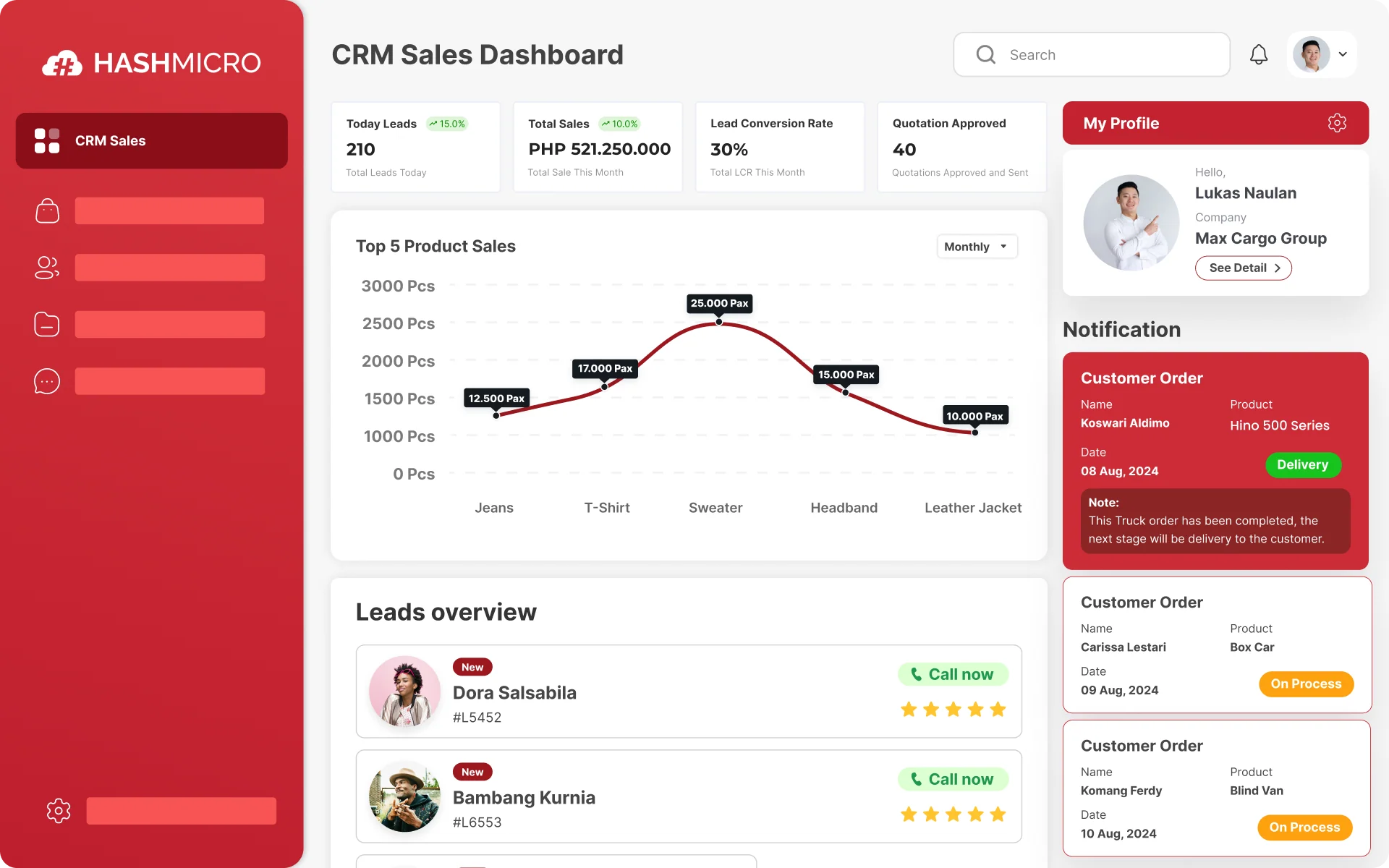 AI can do a lot, but only if it’s built into your team’s workflow in a way that actually makes sense. So, HashMicro CRM Software comes up as one of the best choices in the Philippines, as it’s supported by a smart AI assistant called Hashy.
AI can do a lot, but only if it’s built into your team’s workflow in a way that actually makes sense. So, HashMicro CRM Software comes up as one of the best choices in the Philippines, as it’s supported by a smart AI assistant called Hashy.
The AI is designed to be your team’s smart assistant: always on, always tracking, always ready with the next step. From POS counters to pipeline reviews, HashMicro’s AI works behind the scenes to make your sales process smoother, smarter, and more aligned.
Whether you’re a frontline rep booking meetings or a sales manager reviewing branch performance, you’ll have AI-powered support every step of the way. Furthermore, it’s also integrated with the CRM system as a whole, so every aspect of the sales pipeline is covered.
Features of Hashy AI:
At the POS
- Upsell smarter: Get instant product suggestions based on what customers frequently buy together—perfect for real-time recommendations that increase average order value.
For Sales Reps
- Manage your day with ease: Schedule meetings, track opportunities, and receive activity reminders in one platform.
- No more manual summaries: Auto-generate meeting recaps and submit quotes for approval without extra admin work.
- Keep momentum moving: Easily create and monitor sales activities, ensuring nothing slips through the cracks.
For Sales Leaders
- Approve with confidence: Review and approve quotes directly from the dashboard.
- Stay in the loop: Monitor key metrics like new leads, completed meetings, and rep activities at a glance.
- Make performance visible: View insights comparing sales activity to actual results. See which reps, products, or branches are driving the most impact.
- Spot top performers: Identify high-performing salespeople, best-selling product categories, and standout branches without digging through reports.
| Pros | Cons |
|
|
2. Avoma
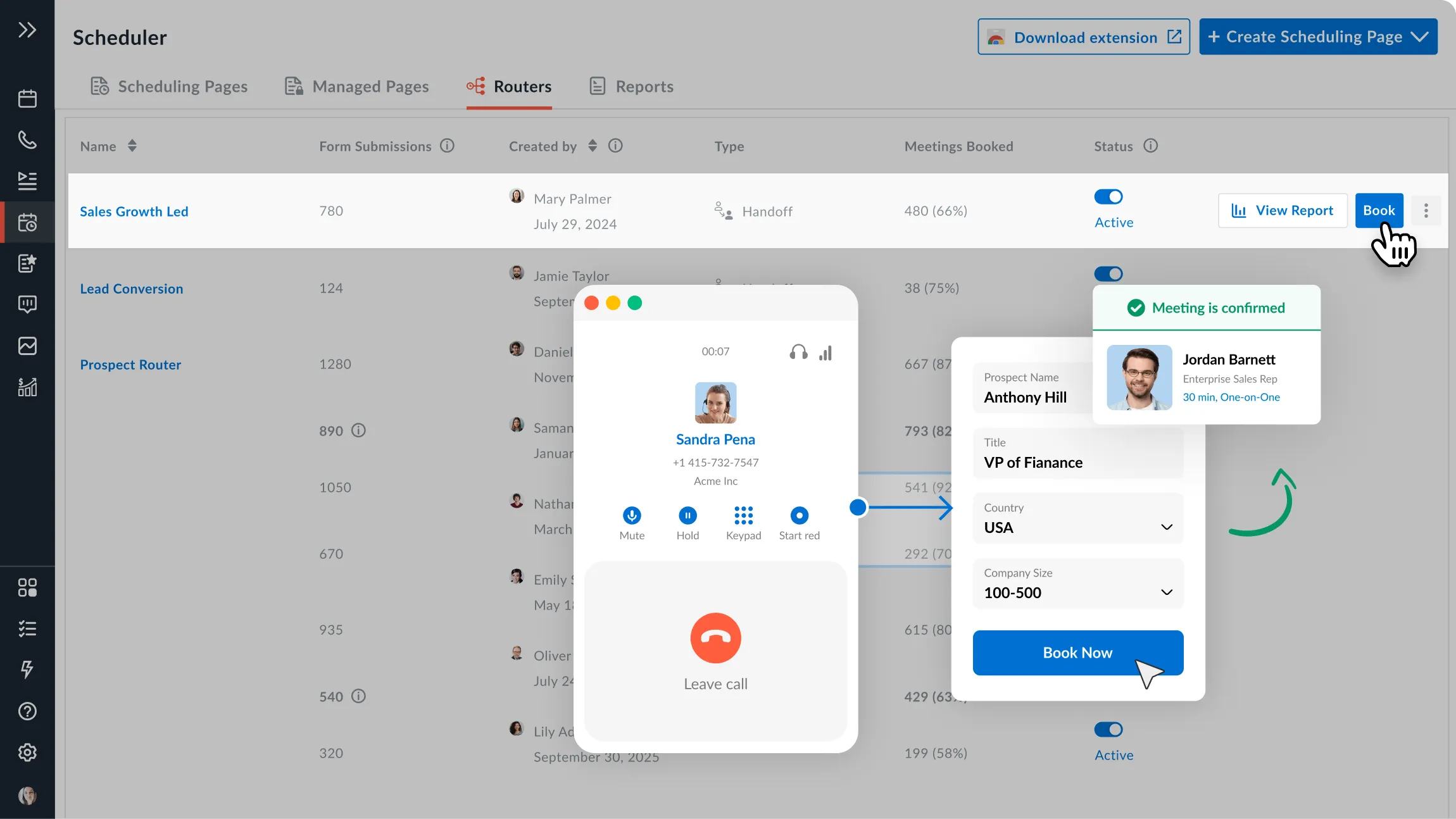 Avoma is a strong choice for sales teams that are looking for AI for sales meetings. It streamlines virtual meetings with features like AI-powered scheduling, transcriptions, CRM integration, summaries, topic tagging, and keyword bookmarks.
Avoma is a strong choice for sales teams that are looking for AI for sales meetings. It streamlines virtual meetings with features like AI-powered scheduling, transcriptions, CRM integration, summaries, topic tagging, and keyword bookmarks.
On top of that, it offers performance insights through analytics and scorecards that track how reps handle key parts of a sales call—like asking about the prospect’s role, tools, or budget. It’s perfect for teams looking to improve sales conversations and connect insights directly to their CRM.
Features:
- Real-time transcription and AI-generated notes
- Scheduler and lead router
- Conversation intelligence
- Revenue intelligence
- CRM data enrichment
| Pros | Cons |
|
|
3. Dialpad
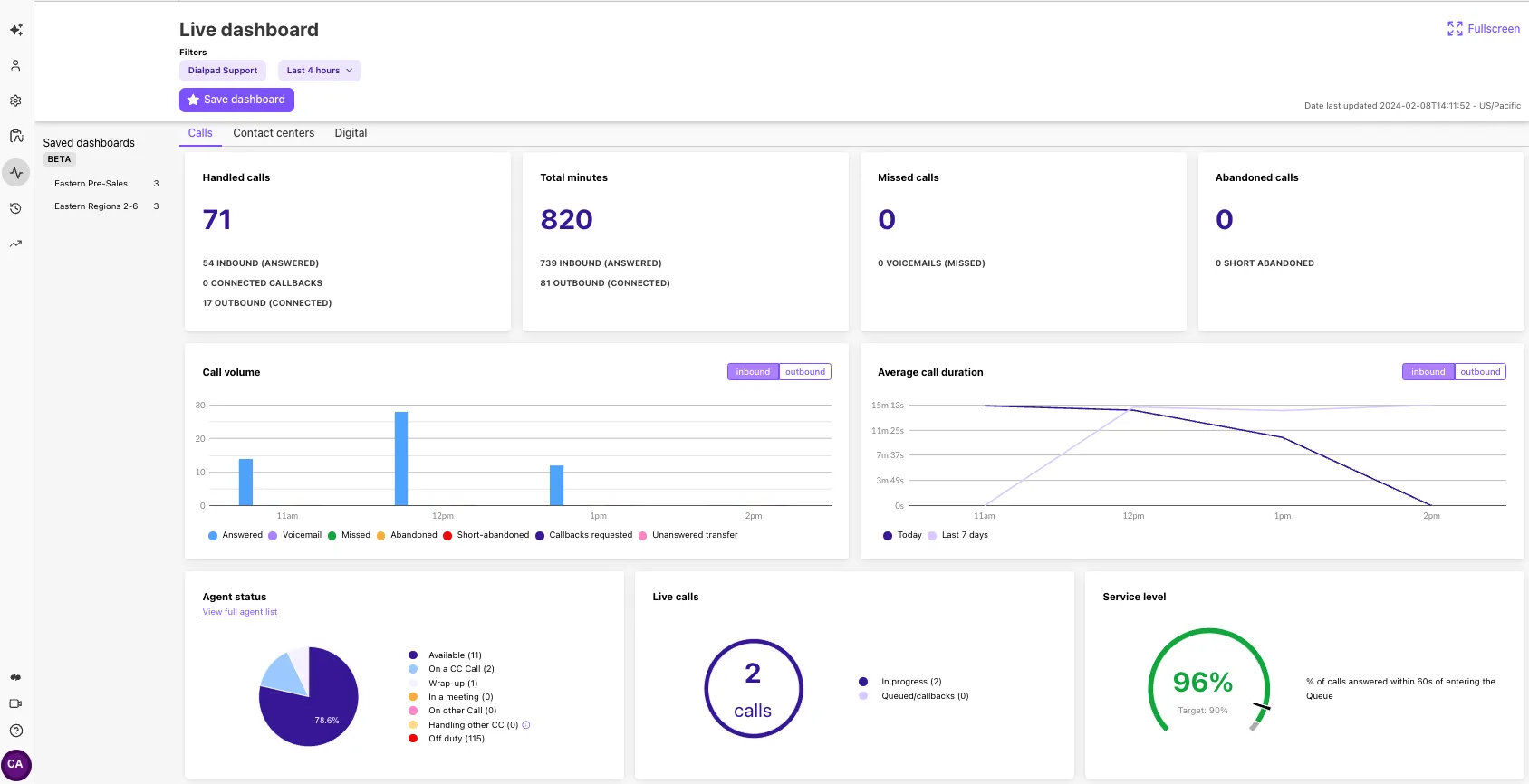 Dialpad is a solid option for sales teams that want AI support across the entire sales call process. It offers real-time transcriptions, sentiment analysis, live coaching prompts, and CRM integration—all built into one communication platform.
Dialpad is a solid option for sales teams that want AI support across the entire sales call process. It offers real-time transcriptions, sentiment analysis, live coaching prompts, and CRM integration—all built into one communication platform.
Beyond call handling, it provides performance tracking through AI scorecards and analytics, helping managers review how reps manage key moments in a conversation, such as handling objections or qualifying leads.
Features:
- Real-time transcription and summaries
- AI-powered assistance
- Sentiment analysis
- Integration with business tools
- AI recaps
| Pros | Cons |
|
|
4. Zapier Agents
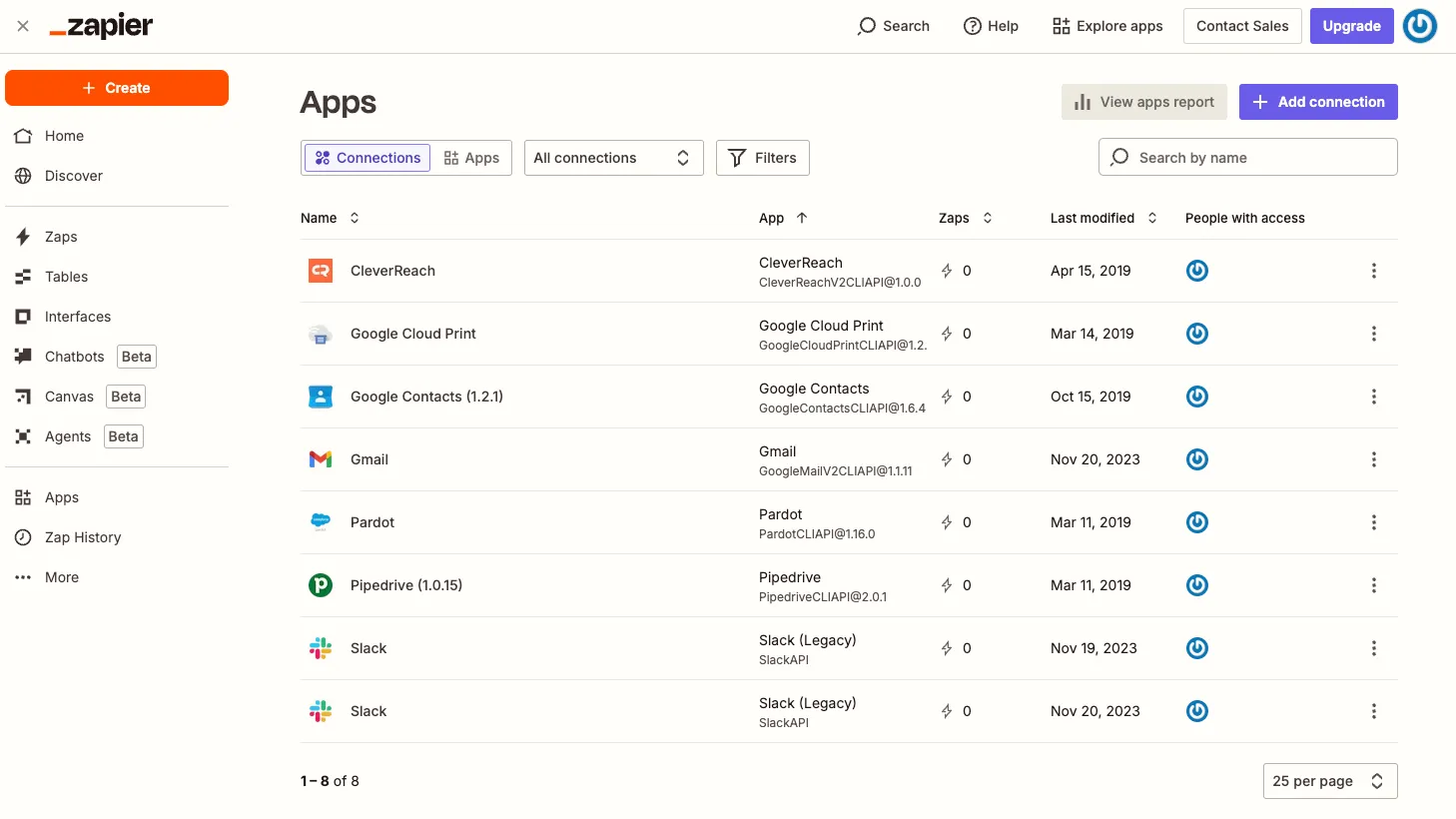 Zapier Agents is an AI workspace that lets teams build custom agents to work across multiple third-party apps. By connecting a data source—like a CRM—these agents can run tasks either on demand or automatically in the background.
Zapier Agents is an AI workspace that lets teams build custom agents to work across multiple third-party apps. By connecting a data source—like a CRM—these agents can run tasks either on demand or automatically in the background.
For instance, when a new lead comes in through Facebook, the agent can summarize the details and send a notification to the sales team, repeating the process for every new entry.
With the ability to link multiple tools, Zapier Agents can support lead management, emails, content creation, project tracking, customer support, and more—making it a flexible AI assistant tailored to any workflow.
Features:
- Extensive app integration
- Customizable AI agents
- Knowledge synchronization
- Automated task execution
| Pros | Cons |
|
|
5. Zendesk
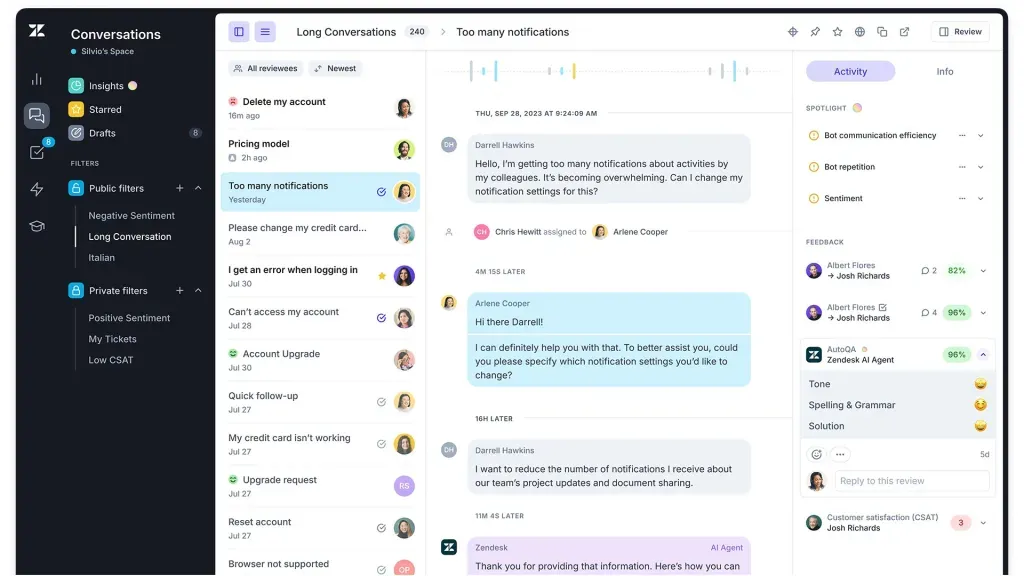 Zendesk Sell is a sales CRM that blends automation with conversational AI to support sales and customer engagement. It helps teams manage leads, track pipeline activity, and maintain customer relationships from one unified platform.
Zendesk Sell is a sales CRM that blends automation with conversational AI to support sales and customer engagement. It helps teams manage leads, track pipeline activity, and maintain customer relationships from one unified platform.
With tools like AI-powered chatbots and Answer Bot, sales and support teams can capture leads, respond to inquiries, and offer assistance across multiple channels, including email, chat, and social media.
Everything is synced back to the CRM, so teams can personalize follow-ups, maintain context, and build stronger customer relationships without added manual effort.
Features:
- Lead scoring
- Intelligent deal insights
- Automated data entry
- Predictive analytics
- Seamless integration with Zendesk Support
| Pros | Cons |
|
|
6. Postaga
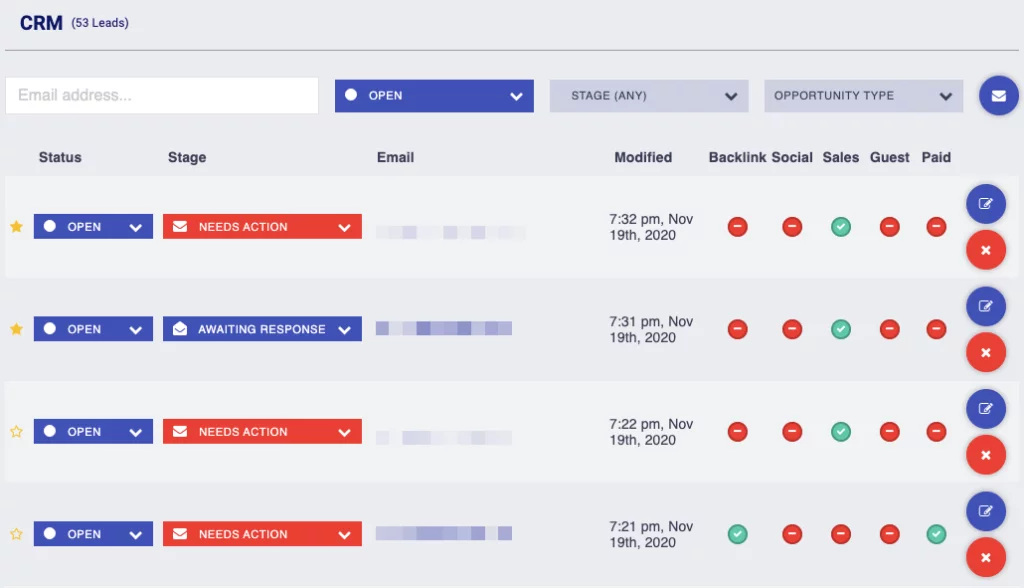 Postaga is an AI-powered outreach platform designed to help teams automate the entire outreach process—from campaign planning to execution. It supports a range of use cases, including cold sales outreach, link building, content promotion, and PR.
Postaga is an AI-powered outreach platform designed to help teams automate the entire outreach process—from campaign planning to execution. It supports a range of use cases, including cold sales outreach, link building, content promotion, and PR.
Users can start by selecting a campaign goal, then follow step-by-step prompts to customize targeting, messaging, and timing. Postaga can also send personalized messages using profile details and custom fields.
Features:
- AI-driven campaign generator
- Opportunity finder
- Automated contact discovery
- Personalized email sequences
- Integrated CRM
| Pros | Cons |
|
|
7. Clay
 Clay is a lead prospecting platform that uses AI to simplify and speed up the process of building targeted outreach lists. Users can choose how much data to pull and even automate email lookup using a waterfall method that cycles through multiple data sources.
Clay is a lead prospecting platform that uses AI to simplify and speed up the process of building targeted outreach lists. Users can choose how much data to pull and even automate email lookup using a waterfall method that cycles through multiple data sources.
Once the list is built, Clay offers enrichment features like scraping recent posts or identifying company competitors to add more context to each profile.
Features:
- Data enrichment
- AI agents
- CRM integration
- Automated outreach
- Workflow automation
| Pros | Cons |
|
|
8. Lavender
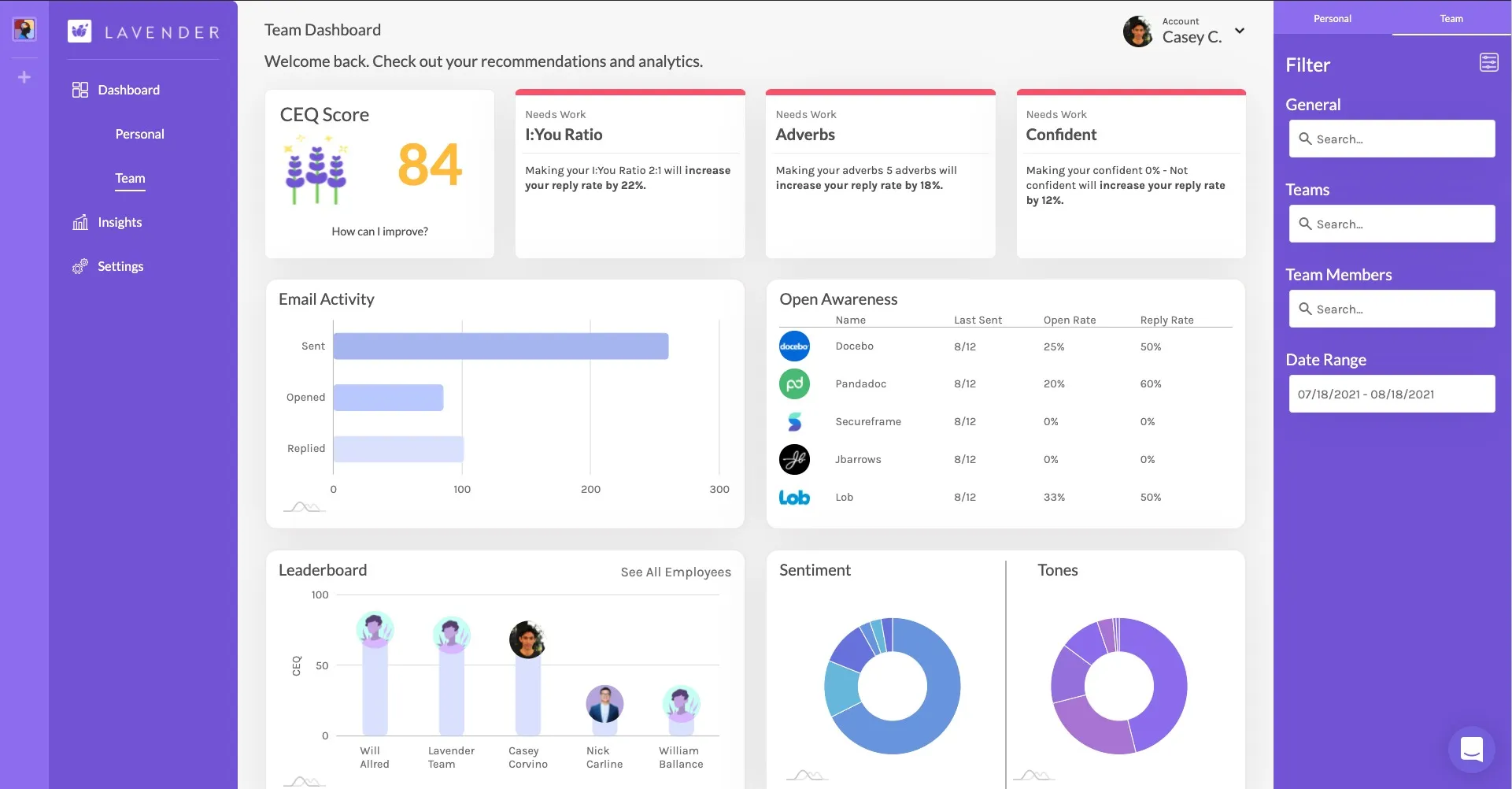 Lavender is an AI-powered email assistant built for sales teams that rely heavily on their inboxes. As a browser extension, it integrates directly with email platforms to help users write more effective messages, faster.
Lavender is an AI-powered email assistant built for sales teams that rely heavily on their inboxes. As a browser extension, it integrates directly with email platforms to help users write more effective messages, faster.
On the team level, Lavender’s dashboard tracks email performance metrics, like open rates, reply rates, and writing quality, and provides coaching insights to help reps improve over time. It’s a handy tool for anyone looking to sharpen their outreach without leaving their inbox.
Features:
- Real-time email scoring and coaching
- Personalization assistant
- Mobile optimization preview
- GIF integration
- Team performance analytics
| Pros | Cons |
|
|
9 Ways to Use AI for Sales
One of AI’s biggest advantages is its ability to handle repetitive tasks like data entry quickly, freeing up sales reps to focus on more people-centric work—like building relationships and closing deals. Here are some examples.
Here are 9 ways that sales teams can utilize AI to maximize their work:
- Spot Negative Calls Instantly: AI flags negative sentiment during live calls so managers can step in before a deal goes south.
- Coach Reps in Real Time: Detects keywords, tracks topics, and provides live prompts or auto-scores to guide reps on the spot.
- Forecast Smarter: Analyzes trends and performance data to help set accurate sales targets and identify growth opportunities.
- Automate the Tedious Stuff: Handles repetitive tasks like dialing, activity logging, and call summaries—so reps can focus on selling.
- Smarter Pricing Decisions: Recommends optimal prices using past deal data, buyer behavior, and competitor trends.
- Clearer Sales Attribution: Tracks which campaigns and touchpoints drive revenue, giving you better ROI insights.
- Always-On Sales Enablement: Surfaces relevant case studies and reviews to support pitches and build trust with prospects.
- Real-Time Performance Feedback: Tracks rep performance and uses AI coaching tools to offer feedback on speaking pace, missed points, and more.
- Playbooks That Keep Reps on Track: Transforms sales methods like BANT or SPIN into live checklists, tracking execution and flagging missed steps.
4 Ways to Build a Powerful Sales AI Plan
 If you’re looking to apply artificial intelligence in sales, you can begin with a few straightforward steps. The key, regardless of which AI tool you choose, is to have a clear understanding of your goals.
If you’re looking to apply artificial intelligence in sales, you can begin with a few straightforward steps. The key, regardless of which AI tool you choose, is to have a clear understanding of your goals.
So, what are the strategies you can use? Here are the four simplest strategies you can implement:
- Set Realistic Expectations: Define clear, measurable, and attainable goals. Let your team know it’s normal to need time to adjust, and encourage open communication during the transition.
- Customize AI to Fit Your Business: Don’t chase flashy tools. Instead, choose AI solutions that align with your business goals, whether that’s growth, customer experience, or efficiency.
- Start with Quick Wins: Focus on small projects with visible impact within 6–12 months. Highlight successful reps as role models to build momentum across the team.
- Work with the Right Experts: Choose platforms that integrate well with your existing tools and workflows. Consider bringing in AI specialists to guide implementation and evaluate impact.
Conclusion
AI in sales helps teams work smarter by automating tasks, analyzing data, and surfacing real-time insights. Bringing in AI in sales is not about replacing people, it’s about freeing them up to build trust and close deals faster.
Looking for a solution that fits your sales flow from top to bottom? You’ll love how HashMicro’s AI works. It’s smart, fast, and built to support reps, managers, and even POS teams in one platform, so it offers a well-rounded system for all aspects of your work.
Skip the guesswork and let your team focus on what truly matters: selling with impact and confidence. Try the free demo today and see how powerful your sales process can really be!

FAQ on AI in Sales
-
How does AI help with sales prospecting?
AI helps sales teams find good leads faster by scanning large amounts of data, such as job titles, industries, and online behavior. This means teams can focus their time on people who are more likely to be interested, instead of wasting effort on the wrong prospects.
-
Can AI write personalized sales emails?
Yes, AI can study customer details—like past interactions, preferences, and company size—to help write emails that feel personal and relevant. As a result, the chances of getting a reply go up, which makes sales outreach more effective.
-
Why is AI useful in sales pipeline management?
AI tracks how deals are moving through the sales funnel and spots patterns that humans might miss. Because of this, sales teams can fix problems earlier, improve their strategies, and close deals more smoothly.
-
How does AI make sales forecasting more accurate?
AI looks at old sales records, market trends, and buying patterns to predict future sales. This helps managers plan better, avoid surprises, and set realistic targets for their teams.




































